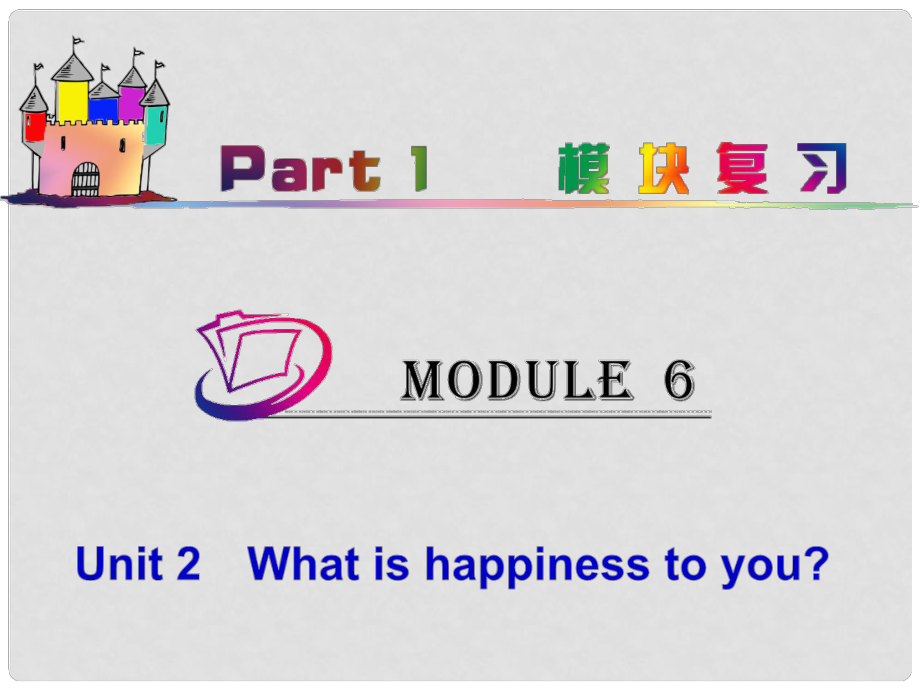《高中英語總復(fù)習(xí) part1 M6Unit 2 What is happiness to you(2)課件 牛津譯林版 新課標(biāo)》由會員分享��,可在線閱讀�,更多相關(guān)《高中英語總復(fù)習(xí) part1 M6Unit 2 What is happiness to you(2)課件 牛津譯林版 新課標(biāo)(25頁珍藏版)》請在裝配圖網(wǎng)上搜索。
1��、【1】 be happy with 對感到滿足Are you happy with your present work?你對目前的工作還滿意嗎?be happy about/in對滿意/滿足be happy to do樂于做I am happy to be of service.我很樂意提供幫助����。be adj. with/about對感到be angry/satisfied/pleased/disappointed with; be excited/nervous/worried aboutHe is worried about the safety of the children.他擔(dān)心孩子
2����、們的安全。He is excited about the results of the examination.他對考試結(jié)果感到很激動����。_ about the response of the audience, the comedian looked out from behind the curtains.A. To be nervous B. NervousC. Nervously D. Being nervousB形容詞短語充當(dāng)狀語?��!?】 apart from(1) 遠(yuǎn)離�����,和不在一起����。His use of language sets him apart from most other
3��、modern writers.他對語言的運用在現(xiàn)代作家中別具一格��。(2)還有“除了”的意思,既可以表示 besides 的意思����,也可以表示 except 或 except for 的意思。(參見M4U3)Apart from some spelling faults, your composition is pretty good.除了一些拼寫錯誤之外你的作文很好�。Apart from funny,go hiking is a good exercise.徒步旅行除了好玩外���,還是良好的運動。 _ tears, only time could wear everything away!A. Ap
4��、art fromB. As a consequence ofC. Regardless ofD. In terms of_ Kate, all the children enjoy music very much.除了凱特以外�,所有的孩子都喜歡音樂。_�����, the trousers dont suit me.褲子不但太大���,而且樣式也不適合我�。_���, I dont know any about French at all.除了幾個詞�,我對法語是一無所知。A句意:除了眼淚外��,只有時間可以沖淡一切�!根據(jù)句意用apart from表示“除之外”;as a consequence of 結(jié)果�����;regardl
5��、ess of 不管���,無論�����; in terms of 依據(jù)��;從方面���。Apart fromApart from being too largeApart from a few words【3】 believe in “信任某人,信仰�;主張,認(rèn)為是好的”���。指對某種思想����、主張、觀念��、行動具有信心��。He believes in Marxism. 他信仰馬克思主義��。They dont believe in kindness to criminals.他主張對罪犯不能仁慈�。believe vt. & vi.“相信����;認(rèn)為”,后面可接名詞�、代詞、that引導(dǎo)的賓語從句�、帶不定式的復(fù)合結(jié)構(gòu),間或接帶形容詞等的復(fù)合
6�、結(jié)構(gòu)。I find it impossible to believe a single word you say.我覺得要相信你說的話是不可能的���。I believe we should buy a smaller one.我認(rèn)為我們應(yīng)買小一點的����。I believe Dr. Manatte (to be) innocent.我認(rèn)為莫耐特醫(yī)生是無罪的。It is believed that the police have found out the cause of the accident.據(jù)認(rèn)為警察已發(fā)現(xiàn)了事故的原因 【注意】如果believe后面接有賓語從句的話�����,且句子含有否定意義�,應(yīng)在主句
7、中否定�����,而不是在賓語從句中否定����,即“否定前移”。They didnt believe that Tom was a thief.他們相信Tom不是小偷�。以Do you think?這樣的句子來提問�����,通常用I think so 或I believe so 來表示肯定�;用I dont think so 或I dont believe so 或I believe not表示否定。 Do you think he will come? 你認(rèn)為他會來嗎�����? I think/believe so. 我認(rèn)為他會來。believe it or not 信不信由你belief n. 信心���,信念There is a
8�、 general belief that things will soon get better.大家普遍認(rèn)為情況很快就會好轉(zhuǎn)�����。Im amazed to hear from my school teacher again. _���, it is ten years since we met last.(2009安徽)A. In a word B. Whats moreC. Thats to say D. Believe it or not Do you think he ought to apologize for what he has done? _.A. I dont believe B.
9����、I dont believe itC. I believe not so D. I believe notD句意:我很吃驚又收到了我的學(xué)校老師的來信����。信不信由你�����,我們已有10年沒有見面了��。believe it or not為插入語,表示“信不信由你”���。D句意:你認(rèn)為他應(yīng)該為他的行為道歉嗎���?在回答以think提問,作否定回答時���,通常用I believe not�����?���!?】 Sang Lan made a mistake while practicing a vault she had done perfectly for many years. 桑蘭在練習(xí)跳馬時在一個多年來做得很好的動作上出現(xiàn)了失誤
10��、�����。這是一個復(fù)合句�,while practicing a vault是由while引導(dǎo)的時間狀語從句。在英語中,如果時間�、地點、條件或方式狀語從句中的主語和主句中的主語一致����,或者從句中主語是it,那么狀語從句中的主語和be動詞常常一起省略���。While (she was) very young, she began to study English.當(dāng)她很小的時候����,她就開始學(xué)英語��。We can go there if (it is) necessary.如果有必要�����,我們可以去那里����。I was reading the book while working on a ship.我在船上邊工作邊看那本書
11�����、���。This dictionary will look nice when printed.這本字典印出來時會很好看����。【2】 I have been happy about different things at different times during my life, but my most vivid and happiest memories are those of school days, so I think that was the happiest time in my life. 在生命的不同階段��,我會因不同事情而快樂��,但是我最鮮活而幸福的回憶是學(xué)生時代的日子�,因此我覺得
12、那是我生命中最快樂的時光�。(1)這是一個由并列連詞 so 連接的并列句,在后面的分句中think后面是一個省略連詞that 的賓語從句���。(2)句中既出現(xiàn)了代詞those��,又出現(xiàn)了代詞that����,those代替前面的復(fù)數(shù)名詞the memories��。that指代前面的整個學(xué)校時光��。one, ones, that, it與those 這幾個詞都可以用作代詞,但所指內(nèi)容不同�����。one代替上文提到的某個單數(shù)可數(shù)名詞��,泛指意義���。一般不是同一個事物����,不能代指前面整句話的意思�。可以用定冠詞��,指示代詞this���、that或形容詞來修飾����。Id like an ice cream. Are you having one
13��、, too?我想買一份冰淇淋���,你也要一份嗎��?(代ice cream)ones代指上文出現(xiàn)的或已知的復(fù)數(shù)名詞�,也是類指����,可以用定冠詞,指示代詞these����、those或形容詞來修飾。How about those ones over there?那邊那些怎么樣�����?(代對方已知事物)The students who are most successful are usually the ones who come to all the classes.成績最好的學(xué)生往往是出全勤的那些人�。(代students)that特指意義。既可以代指較遠(yuǎn)的人或物���,也可以指已經(jīng)提到的或已知的人或物���,還可以用來代指前面
14、整句話的意思��。不能用冠詞或形容詞修飾。Whos that?那是誰���?(代較遠(yuǎn)的人)Thats exactly what I think.我正是那么想的����。(代已知內(nèi)容)Bob was late again. That was why he was criticized.鮑勃又遲到了�����,這就是他受到了批評的原因���。(代前面整句話的意思)it指上文提到的同一個事物����,還可以指嬰兒或性別不詳者�����,能代指前面整句話的意思�。通常用作形式主語和形式賓語。不能用冠詞或形容詞修飾����。I have $100. Will it be enough for a deposit?我有100美元���,夠不夠做押金?(代money)Her
15����、 baby is due next week. She hopes it will be a boy.她的孩子下周就要出生���,她希望是個男孩�����。(代嬰兒)I find it strange that he doesnt want to go.他竟然不想去��,我覺得奇怪���。(作形式賓語)those 是that的復(fù)數(shù)形式,指“那些”�����,表示特指����,代指提到的或已知的復(fù)數(shù)名詞�。Salaries are lower here than those in my city.這里的薪水沒有我市的高���。(代提到的事物salaries)There are those who say he shouldnt have been
16���、 punished.有些人說他本不應(yīng)該受到懲罰。(代some people)Nine in ten parents said there were significant differences in their approach to educating their children compared with _ of their parents. (2009江蘇)A. those B. one C. both D. thatThere is a remarkable difference between the short poems that were written in English around the year 1,500 and _ written around 1,600.A. that B. one C. those D. onesD句意:10個家長中有9個說他們教育孩子的方法與他們父輩教育孩子的方法相比有很大的差別��。根據(jù)句意空白處需替代的詞是approach���,因此用代詞that代替�����。C句意:在1500年左右創(chuàng)作的詩歌與1600年左右創(chuàng)作的詩歌之間存在顯著差別��。written around 1,600在句中作后置定語�����,修飾空白處的詞�,因此是特指��,此處those代替the short poems�����。如果選擇D項,需要在前面加the��。
 高中英語總復(fù)習(xí) part1 M6Unit 2 What is happiness to you(2)課件 牛津譯林版 新課標(biāo)
高中英語總復(fù)習(xí) part1 M6Unit 2 What is happiness to you(2)課件 牛津譯林版 新課標(biāo)

